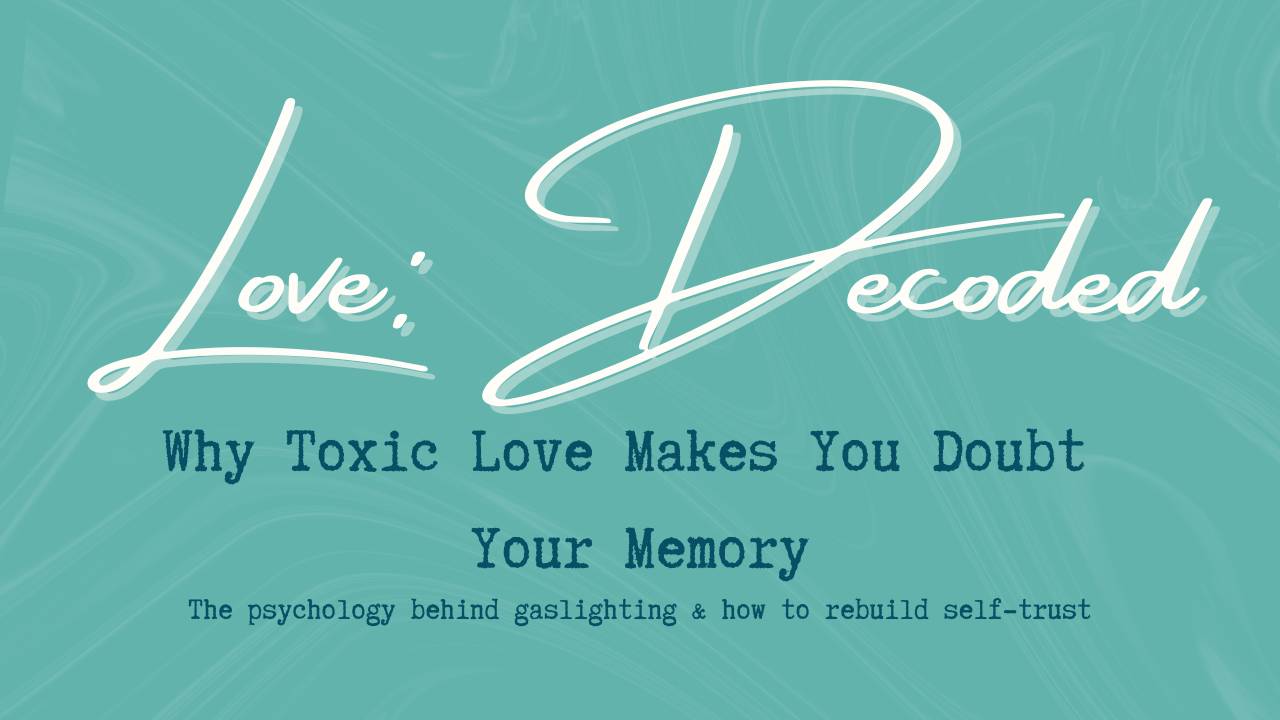
Why Toxic Relationships Make You Doubt Your Memory - And How to Trust Yourself Again
Aug 11, 2025“I swear you said that.”
“No, I didn’t. You’re imagining things.”
It’s a conversation you’ve had before - and it leaves you rattled.
You know you remember it. You can hear their voice saying the words.
But when they deny it with such certainty… a crack of doubt sneaks in.
Maybe I did get it wrong? Maybe I am overreacting?
If this feels familiar, you’re not alone - and you’re not losing your mind.
There’s a reason toxic relationships can make you second-guess your own memories, and it’s not because you’re “too sensitive” or “crazy.”
Let’s look at what’s really going on.
The Psychology Behind Memory Doubt
Toxic and abusive situations - especially ones involving gaslighting - can disrupt your memory in two main ways:
1. Gaslighting and ‘Memory Rewriting’
Gaslighting isn’t just someone lying. It’s a sustained tactic of making you question your perception of reality.
Over time, repeated denials (“I never said that”) or distortions (“that’s not what happened at all”) reprogramme your recall.
When someone persistently disputes your version of events - with confidence, calmness, or even mockery - your brain begins to store their version alongside yours.
The result? Each time you revisit the memory, it feels less certain, more foggy.
2. Stress, Trauma, and the Brain
When you’re in a high-stress or emotionally unsafe environment, your brain goes into survival mode.
Here’s the neuroscience bit:
-
The amygdala (fear centre) goes into overdrive.
-
The hippocampus (memory processing centre) can shrink and function less efficiently when exposed to chronic stress.
-
This means your memories may become less detailed and harder to retrieve - especially for day-to-day conversations.
It’s not that the events didn’t happen.
It’s that your brain was too busy scanning for danger to neatly file them away.
Why This Is So Damaging
When you start doubting your memory, you lose trust in yourself.
And when you stop trusting yourself, it becomes much harder to:
-
Set boundaries (“maybe I’m overreacting”)
-
Call out unhealthy behaviour (“maybe I misunderstood”)
-
Leave harmful situations (“what if I’m wrong about how bad it really was?”)
This is why so many survivors of emotional abuse stay longer than they wanted to - the manipulation works on your confidence, not just your emotions.
How to Start Trusting Your Memory Again
1. Keep a Reality Log
Write down key events, conversations, and feelings as soon as possible after they happen.
You’re not doing this to build a “case” - you’re doing it to remind yourself, in black and white, what you experienced.
2. Anchor with Your Body
Memory isn’t just stored in words and images - it’s in sensations, too.
When you recall an event, notice:
-
Did your chest feel tight?
-
Was your voice shaky?
-
Were you relaxed or on edge?
These physical cues can help confirm the truth of an experience, even if the details feel blurry.
3. Limit Real-Time Debates
If someone denies your memory, resist getting stuck in a circular argument.
Instead, use a grounding phrase like:
“We remember this differently - but this is how I recall it.”
4. Practice Micro-Decisions
Rebuilding trust in yourself starts small:
-
Which mug do I feel like using today?
-
Do I want to walk or drive?
-
Do I actually like this song?
Every time you make a small choice without second-guessing, you strengthen your self-trust muscle.
The Bottom Line
If you’ve been in a relationship that made you doubt your memory, it’s not because you’re unreliable - it’s because your brain has been working overtime to keep you safe.
With time, tools, and self-compassion, you can rebuild the confidence to say:
“I know what I saw. I know what I felt. I trust myself.”
💡 Want a guided way to untangle what really happened in your relationship?
Download The Relationship Mirror Toolkit - our free resource to help you see your experiences more clearly, understand toxic experienced, and start trusting your own story again.
I'd love to hear from you with your thoughts about this blog. Email me at [email protected] with your feedback, experiences and ideas for other blog posts you'd like to see coming your way!
Eve x
Founder, The Healthy Relationship Company
📲 @thehealthyrelationshipcompany
📧 [email protected]
Stay in the loop!
Get psychology-backed relationship tips straight to your inbox.
We hate spam. We will never sell your information, for any reason. By subscribing to The Clarity Drop Newsletter, you also agree to receive occasional updates and marketing. We will only send things that would be genuinely useful to you. Unsubscribe at any time.
